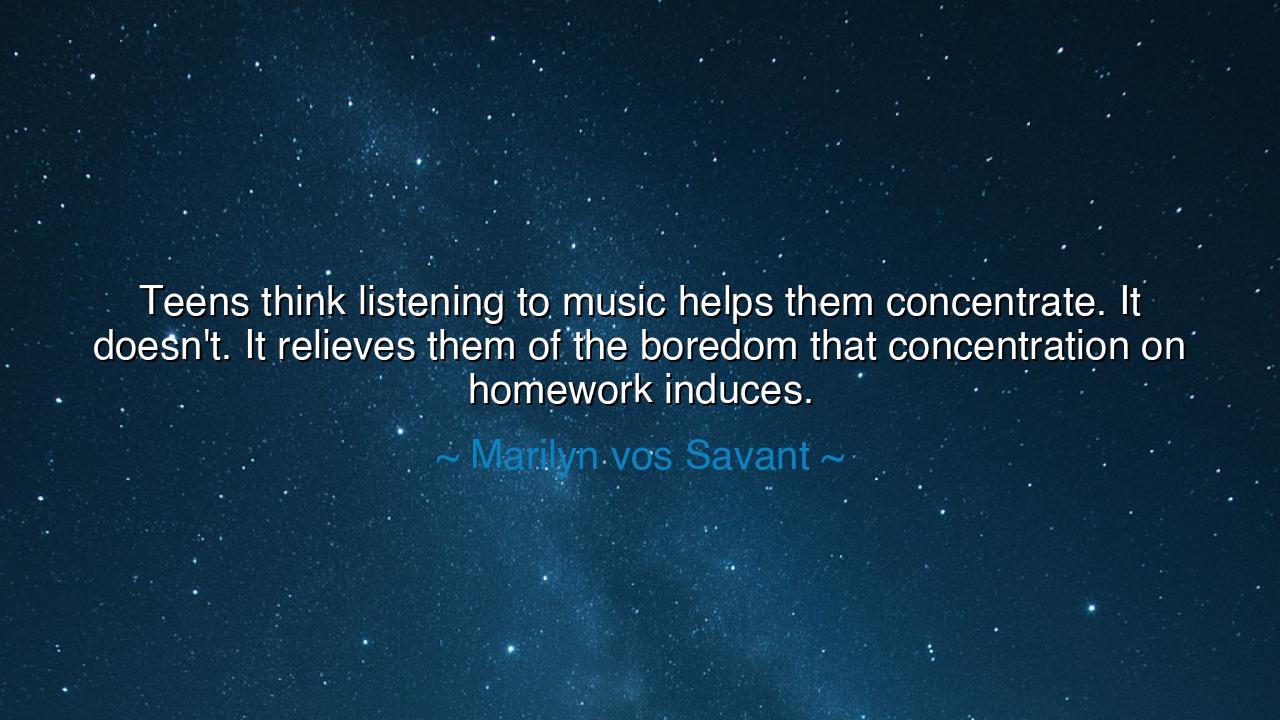
Teens think listening to music helps them concentrate. It
Teens think listening to music helps them concentrate. It doesn't. It relieves them of the boredom that concentration on homework induces.






Marilyn vos Savant, famed for the sharpness of her reason, once declared: “Teens think listening to music helps them concentrate. It doesn’t. It relieves them of the boredom that concentration on homework induces.” These words strike like a lamp in the fog, exposing what the heart knows but the mind often disguises. For in this statement, she reveals not only something about youth, but about human nature itself: when faced with labor, especially the kind that demands endurance of mind, we long for escape. Music may soothe the spirit, but it does not sharpen the blade of focus—it merely makes the weight of boredom easier to carry.
The ancients themselves wrestled with this truth. The philosophers of Greece taught that the path to wisdom was not paved with delights, but with discipline. Plato warned against confusing pleasure with learning, for while pleasure may make the journey sweeter, it cannot replace the effort of thought. Vos Savant echoes this ancient warning: do not mistake relief from discomfort for true concentration. To endure the stillness of the mind, to walk through boredom without fleeing—that is the true training of intellect.
Consider the story of Thomas Edison, the relentless inventor. He worked in silence, sometimes through the night, his focus unbroken by distractions. His biographers tell us that his workshop was often quiet save for the scratch of tools and the hum of thought. Had he sought constant diversion to escape the tedium of failure and repetition, the lightbulb, the phonograph, the countless marvels he gifted humanity would never have been born. His genius was not only in vision, but in his endurance of boredom, his willingness to stay with the work until the breakthrough arrived.
Vos Savant’s words also uncover a paradox: teens, and indeed many adults, claim that music sharpens focus. In truth, it disguises the deeper reality: that much of our work is dull, and our minds hunger for stimulation. Music becomes a veil, making the mind feel alive while the body sits in labor. Yet this is not focus, but escape. To confuse the two is to deceive oneself. The true task of life is to learn to find meaning even in the slow grind, to endure the barren field until the harvest appears.
But do not misunderstand—vos Savant does not condemn music, nor should we. Music has its sacred place: it uplifts, heals, inspires. It is the companion of joy and the balm of sorrow. Yet in the hour of study, of work, of deep concentration, it may rob us of the silence we need to cultivate strength. The ancients often sought solitude and quiet to hear the deeper voice of thought. The Pythagoreans practiced stretches of silence, believing that wisdom could not be shouted over melody.
The lesson, then, is this: do not fear boredom. For boredom is the gateway to deeper insight. The mind, when denied constant distraction, begins to stretch, to dig, to discover. The student who dares to endure it, to resist escape, learns not only their subject but themselves. They learn patience, resilience, and the power of inner focus. These are treasures far greater than the fleeting comfort of background sound.
Practical wisdom follows: when you face work, notice your impulse to flee into distraction. If you reach for music, ask yourself: Am I seeking focus, or am I seeking escape? Then, at least for a time, put aside the diversions. Sit with the stillness. Let boredom sharpen you. Practice concentration as one practices strength—through repetition, through endurance, through discomfort. Little by little, you will discover a deeper power: the ability to focus without escape, to labor with clarity, to master the mind.
So remember the words of Marilyn vos Savant: “Teens think listening to music helps them concentrate. It doesn’t. It relieves them of the boredom…” Let this truth not be a rebuke, but a revelation. For if you can endure the silence, if you can withstand the boredom, then you will find the discipline that leads to mastery. And mastery, not comfort, is the path to greatness.






AAdministratorAdministrator
Welcome, honored guests. Please leave a comment, we will respond soon